2022年人教版中考英语二轮复习 第十二节 宾语从句 课件(共51张PPT)
文档属性
| 名称 | 2022年人教版中考英语二轮复习 第十二节 宾语从句 课件(共51张PPT) | 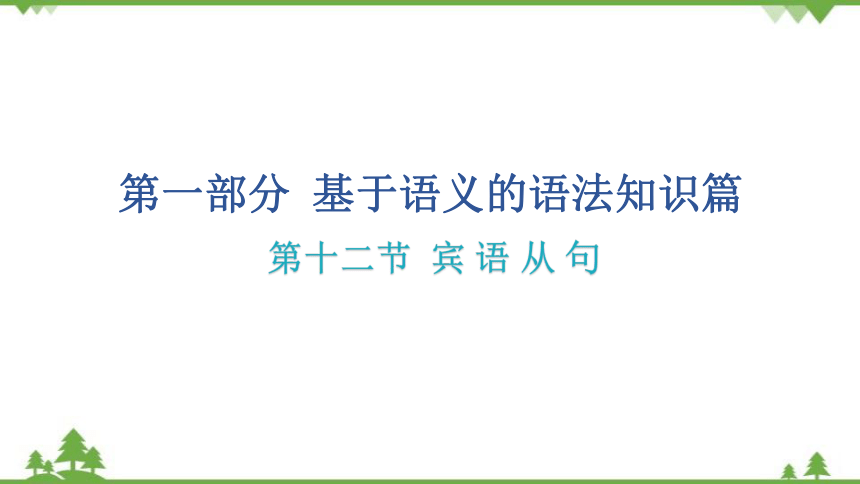 | |
| 格式 | pptx | ||
| 文件大小 | 423.9KB | ||
| 资源类型 | 教案 | ||
| 版本资源 | 人教新目标(Go for it)版 | ||
| 科目 | 英语 | ||
| 更新时间 | 2022-05-24 19:06:19 | ||
图片预览

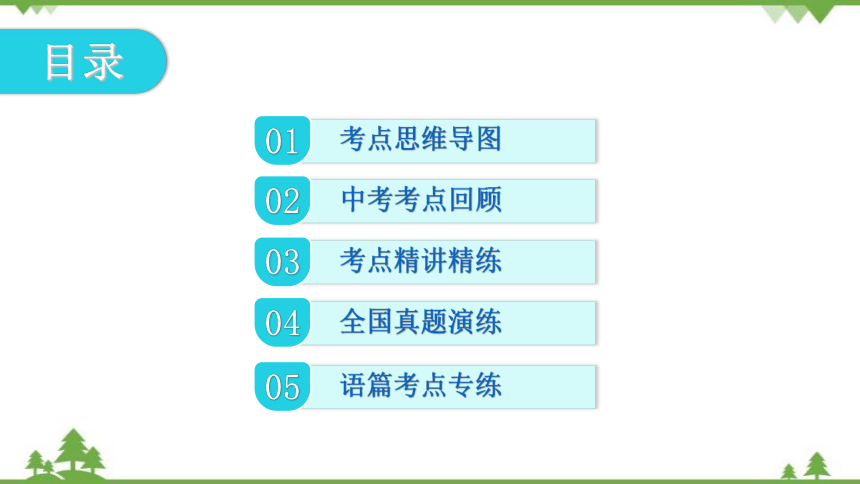
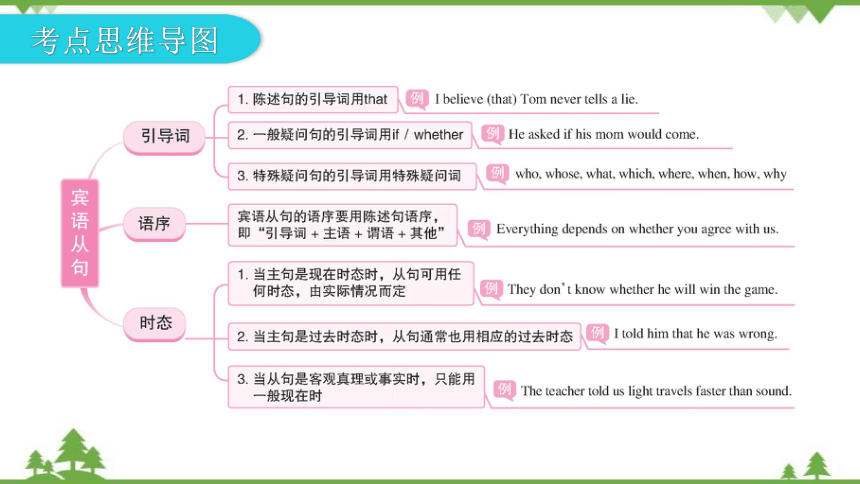


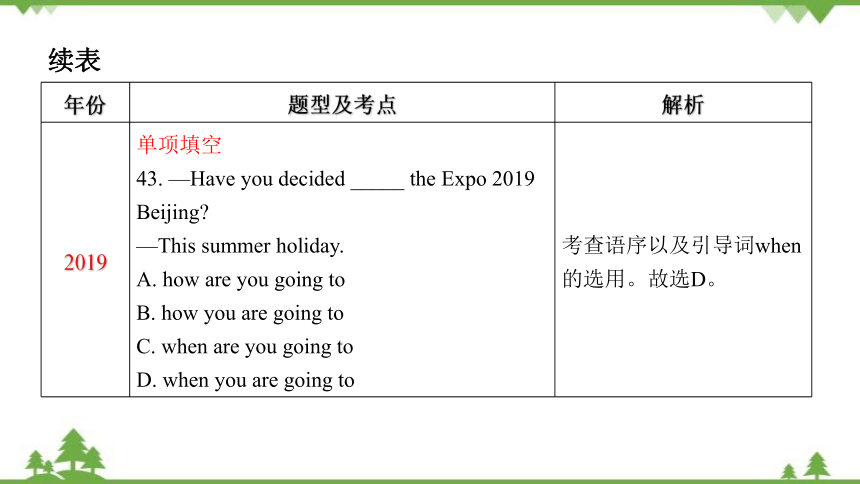
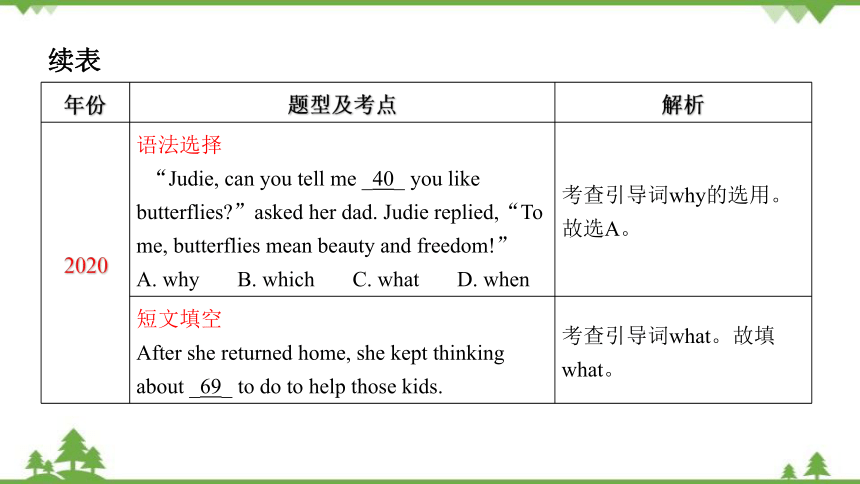
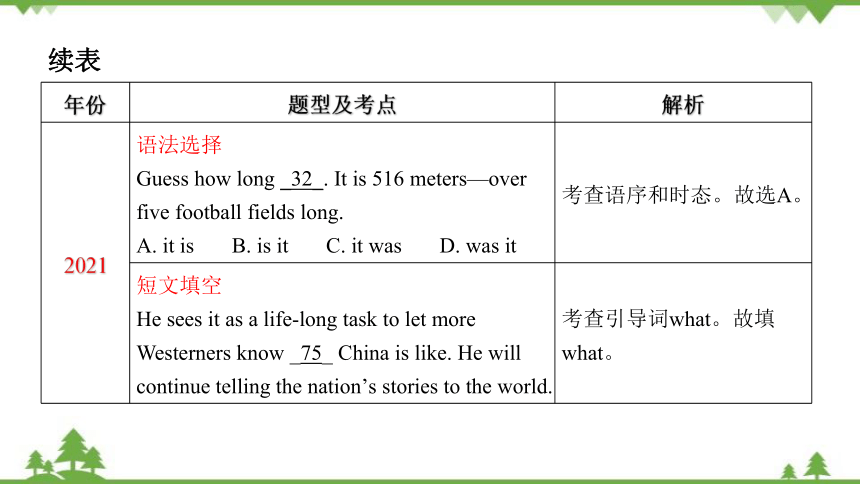
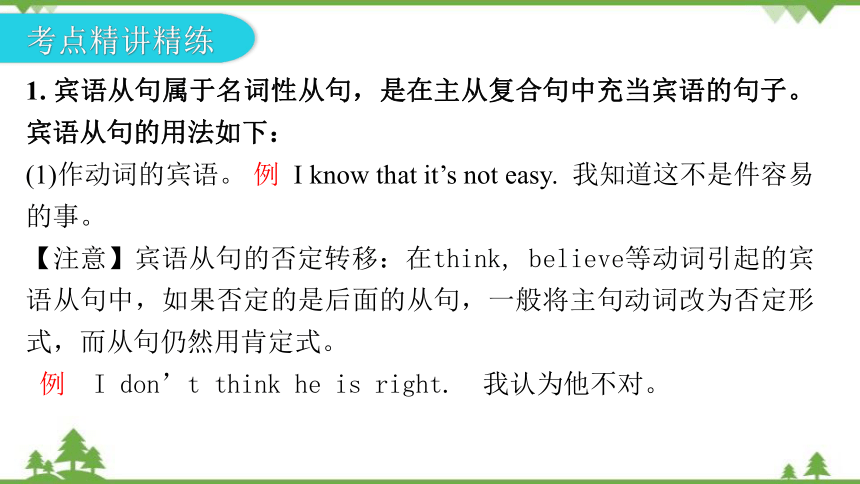
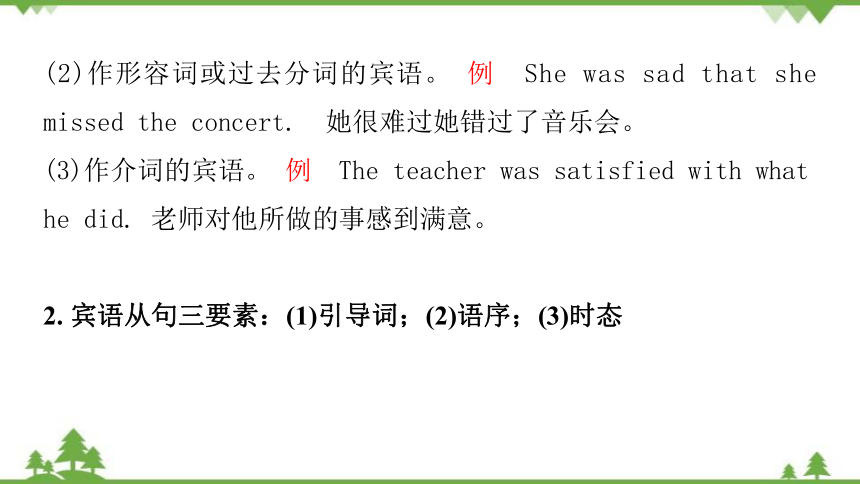

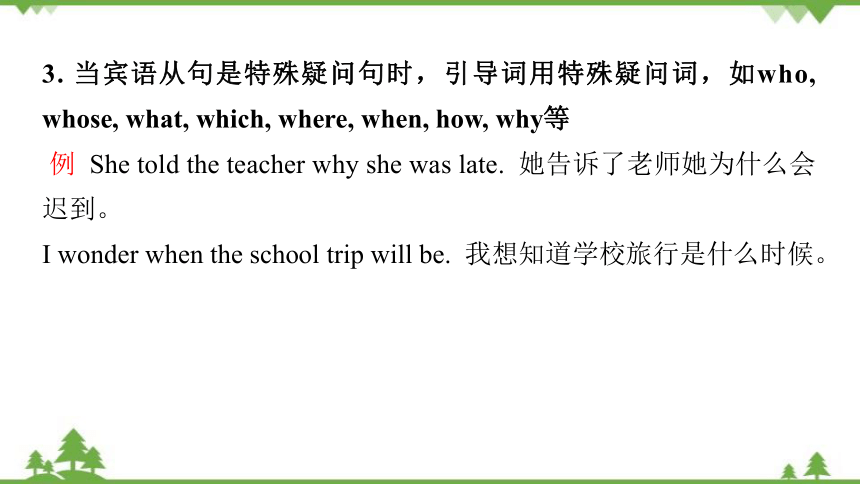
文档简介
(共51张PPT)
第一部分 基于语义的语法知识篇
第十二节 宾 语 从 句
目录
01
考点思维导图
02
中考考点回顾
03
考点精讲精练
04
全国真题演练
05
语篇考点专练
考点思维导图
中考考点回顾
年份 题型及考点 解析
2017 单项填空 43. —Do you know _____ yesterday —Yes. He went for the boat race. A. why didn’t Peter go to school B. why doesn’t Peter go to school C. why Peter didn’t go to school D. why Peter doesn’t go to school 考查语序,以及主句为一般现在时的从句时态。故选C。
年份 题型及考点 解析
2018 单项填空 44. —Could you tell me _____ you’d like me to pay you —You’d better use mobile payment. I don’t care _____ it is Ali Pay or WeChat Pay. A. how, whether B. how, why C. what, whether D. what, why 考查引导词how和whether的选用。故选A。
续表
年份 题型及考点 解析
2019 单项填空 43. —Have you decided _____ the Expo 2019 Beijing —This summer holiday. A. how are you going to B. how you are going to C. when are you going to D. when you are going to 考查语序以及引导词when的选用。故选D。
续表
年份 题型及考点 解析
2020 语法选择 “Judie, can you tell me _40_ you like butterflies ”asked her dad. Judie replied,“To me, butterflies mean beauty and freedom!” A. why B. which C. what D. when 考查引导词why的选用。故选A。
短文填空 After she returned home, she kept thinking about _69_ to do to help those kids. 考查引导词what。故填what。
续表
年份 题型及考点 解析
2021 语法选择 Guess how long _32_. It is 516 meters—over five football fields long. A. it is B. is it C. it was D. was it 考查语序和时态。故选A。
短文填空 He sees it as a life-long task to let more Westerners know _75_ China is like. He will continue telling the nation’s stories to the world. 考查引导词what。故填what。
续表
考点精讲精练
1. 宾语从句属于名词性从句,是在主从复合句中充当宾语的句子。宾语从句的用法如下:
(1)作动词的宾语。 例 I know that it’s not easy. 我知道这不是件容易的事。
【注意】宾语从句的否定转移:在think, believe等动词引起的宾语从句中,如果否定的是后面的从句,一般将主句动词改为否定形式,而从句仍然用肯定式。
例 I don’t think he is right. 我认为他不对。
(2)作形容词或过去分词的宾语。 例 She was sad that she missed the concert. 她很难过她错过了音乐会。
(3)作介词的宾语。 例 The teacher was satisfied with what he did. 老师对他所做的事感到满意。
2. 宾语从句三要素:(1)引导词;(2)语序;(3)时态
考点1
引导词
1. 当宾语从句是陈述句时,引导词用that,that无词义,可以省略
例 I believe (that) he will return on time. 我相信他会准时回来。
2. 当宾语从句是一般疑问句时,引导词用if/whether。if和whether通常可以互相替换,但是如果有or或or not时,只能用whether
例 She wondered if/whether she had another chance. 她想知道她是否有另一次机会。
I can’t say whether or not he can come on time. 我说不准他是否能够按时到达。
3. 当宾语从句是特殊疑问句时,引导词用特殊疑问词,如who, whose, what, which, where, when, how, why等
例 She told the teacher why she was late. 她告诉了老师她为什么会迟到。
I wonder when the school trip will be. 我想知道学校旅行是什么时候。
【注意】在疑问词引导的宾语从句中,当从句主语与主句主语或间接宾语一致时,从句可以简化为“疑问词+不定式”结构。
例 I didn’t know how I could do it. = I didn’t know how to do it.我不知道怎么做。
Mike didn’t decide what he would buy. = Mike didn’t decide what to buy. 迈克没有决定要买什么。
( )1. I think ____ it is a good way to learn English by listening to English songs.
A. that B. if C. how D. when
( )2. I want to know _____ Tom had a good time having a picnic yesterday.
A. that B. if C. what D. which
A
B
( )3. Have you figured out _____ you can make yourself look more beautiful while taking a selfie(自拍)
A. when B. whether C. how D. who
( )4. Always tell your parents _____ you are going and _____ you expect to be home.
A. what; where B. when; where
C. where; what D. where; when
C
D
( )5. —Could you tell me _____ Drake is so popular among young people
—Because he gets his music come to life.
A. how B. why C. when D. whose
B
考点2
语序
宾语从句的语序要用陈述句语序, 即“引导词+主语+谓语+其他”
例 —Could you tell me when people eat yuanxiao in China?你能告诉我在中国人们什么时候吃元宵吗?
—Usually at the Lantern Festival. 通常是在元宵节。
We couldn’t find out whose bike it was, so we wrote a “Lost and Found”. 我们查不出那是谁的自行车,所以我们写了“失物招领”。
( )1. Do you know _____ Tianjin or not the day after tomorrow.
A. whether are they leaving for
B. whether they are leaving for
C. why they are leaving for
D. if are they leaving for
B
( )2. —Can you imagine ____ in Wuhan?
—Yes, for just 10 days. That’s amazing.
A. how long did Chinese workers build Huoshenshan Hospital
B. how long Chinese workers built Huoshenshan Hospital
C. how far did Chinese workers build Huoshenshan Hospital
D. how far Chinese workers built Huoshenshan Hospital
B
( )3. —Do you know _____ to his three children
—Yes. He told them always to keep working no matter how rich they were.
A. what did Stephen Hawking say
B. what Stephen Hawking said
C. how did Stephen Hawking say
D. how Stephen Hawking said
B
( )4. —I wonder _____.
—It will fall on a Saturday.
A. how will National Day fall on this year
B. how National Day will fall on this year
C. what day will National Day fall on this year
D. what day National Day will fall on this year
D
( )5. —Could you please tell me _____ about the CCTV Host Competition
—Let’s check it on the Internet.
A. how can I get the information
B. how I can get the information
C. why can I get the information
D. why I can get the information
B
1. 当主句是现在时态时,从句可用任何时态,由实际情况而定
例 —Do you know what makes Finland the happiest country in the world 你知道是什么让芬兰成为世界上最幸福的国家吗?
—It’s hard to say. 这很难说。
考点3
时态
2. 当主句是过去时态时,从句通常也用相应的过去时态
例 The story told how the four girls made a movie within just three days. 这个故事讲述了4个女孩是如何在3天内制作了一部电影。
The boy was asking his teacher how he could give a great speech in public. 这个男孩在询问他的老师如何在公共场合发表精彩演讲。
3. 当从句是客观真理或事实时,只能用一般现在时
例 My mother told me that the earth moves around the sun. 我妈妈告诉我地球绕着太阳转。
( )1. —You’d better take an umbrella. The weather report says it _____ in the afternoon.
—Thank you. I will put one in my bag.
A. will rain B. rains C. is raining D. rain
A
( )2. The Ministry of Foreign Affairs (外交部) said _____ if they traveled to dangerous places without paying attention to its warnings.
A. that people will have to pay for their rescue (救援)
B. that people would have to pay for their rescue
C. whether people will have to pay for their rescue
D. whether people would have to pay for their rescue
B
( )3. —David asked _____ in China.
—Of course not. Chinese usually shake hands with a lady as a greeting.
A. why he can greet a lady by kissing her
B. why he could greet a lady by kissing her
C. whether he can greet a lady by kissing her
D. whether he could greet a lady by kissing her
D
( )4. —I want to know _____ in 2050.
—Maybe two out of three.
A. how many people will live in cities
B. how many people lived in cities
C. when people will live in cities
D. when people lived in cities
A
( )5. Everyone answered _____.
A. if there are sixty minutes in an hour
B. if there were sixty minutes in an hour
C. that there are sixty minutes in an hour
D. that there were sixty minutes in an hour
C
全国真题演练
( )1. —Could you please tell me _____
—Next Thursday morning. (2021 北京)
A. when we visited the Capital Museum
B. when did we visit the Capital Museum
C. when we will visit the Capital Museum
D. when will we visit the Capital Museum
C
( )2. —Jim is planning a trip to Shanghai this weekend, but still doesn’t decide _____.
—Why not take the high-speed railway It’s fast and comfortable. (2021 盐城)
A. who will he visit B. what he will do
C. how he’s going there D. whom is he going with
C
( )3. Tomorrow is Earth Day. Let’s discuss _____. (2021 连云港)
A. when shall we give out the leaflets
B. what we can do to recycle things
C. how should we save more energy
D. whether can we make our city greener
B
( )4. —Amy, I wonder _____ in the street when I come to pick you up.
—Well, there’s a big tree by the front gate and it’s covered in lovely white flowers at the moment. (2021 苏州)
A. how will I find your house B. how I will find your house
C. when I will find your house D. when will I find your house
B
( )5. —Did you have a good time in Shanghai
—Yes, come and look. My photos will show you _____. (2021 滨州)
A. how did we go there
B. where we will go
C. when did we meet
D. what the trip was like
D
( )6. —Do you know _____
—At 9:00 tomorrow morning. (2020 北京)
A. when the video meeting began
B. when did the video meeting begin
C. when the video meeting will begin
D. when will the video meeting begin
C
( )7. My cousin will drive me to school today, but I don’t know _____. (2020 河北)
A. what he’ll do B. where he’ll go
C. when we’ll leave D. why we’ll go there
( )8. —Do you know _____ to see the Beijing Opera
—Yes, you can go to Mei Lanfang Theater. (2020 天津)
A. where can we go B. where we can go
C. when shall we go D. when we shall go
C
B
( )9. —Do you know _____
—In Stratford, England. (2020 温州)
A. where Shakespeare was born
B. when Shakespeare finished school
C. how many plays Shakespeare wrote
D. why Shakespeare’s works are popular
A
( )10. I have some tickets for the football match. I called my friends to see _____. (2020 连云港)
A. where did they buy them
B. why they liked to go there
C. when did we go together
D. whether they’d like to go
D
一、语法选择
When I was in the eighth grade, my class was assigned(指派) to be friends with the second-grade kids. I got this little girl named Shelley. The first time I saw her, she was silent and cold. I asked her _1_ she’d like to talk to me. She refused directly.
语篇考点专练
whether
I tried _2_ I could do to get into her heart. One time, I gave her a coloring book and said, “Shelley, now you can color in it any time.”
Shelley looked at the coloring book and finally looked away. By that, I didn’t know _3_ I could get through to the little girl, but I knew _4_ I wouldn’t give up on her.
what
how
that
One Friday, I decided to tell her a story about my childhood. I told her _5_ lonely when I was with my classmates. That was because I thought only my teachers liked me. I also told her that _6_ a battle(战役) for me. I fought back tears so people wouldn’t know how much _7_ hurting.
She sat there just listening, trying to decide _8_ I was lying or not. Finally, when my story ended, there were tears in
why I felt
every day was
I was
whether
her eyes. And then she said, “Thank you.” I didn’t remember clearly _9_ to change. But I could gradually see her smiling and talking with other kids.
Looking back at this, I’m in awe(惊叹) because all I did was to help her realize _10_ she wasn’t alone. I didn’t ask her to tell her story because her story is my story. (2021 北京改编)
when she started
that
( )1. A. whether B. what C. how D. that
( )2. A. if B. what C. how D. that
( )3. A. whether B. what C. how D. that
( )4. A. if B. what C. how D. that
( )5. A. why I felt B. why did I feel
C. when I felt D. when did I feel
A
B
C
D
A
( )6. A. was every day B. is every day
C. every day was D. every day is
( )7. A. was I B. am I C. I was D. I am
( )8. A. whether B. if C. how D. that
( )9. A. when she started B. when she starts
C. why she started D. why she starts
( )10. A. if B. what C. how D. that
C
C
A
A
D
二、短文填空
Do you know _1_ smart phones can do for us We can make phone calls,take photos,call a taxi,send short messages or e-mails,check e-mails,surf the Internet and watch videos almost anywhere. Especially,shopping on the smart phones has become more and more popular in our life _2_ people can buy almost everything that they need there. You are
what
because
wondering _3_ we can shop on the smart phones Let me show you. _4_ you live in the central part of the city, and you need to buy some fresh grapes from the east of the city, you can use your smart phone. To start with, all you need to do is to download a shopping app and find a suitable store _5_ you like.
Shopping on the smart phones has a lot of advantages, of which the most important is perhaps its convenience. People
how
If
which / that
don’t have to waste a lot of energy or time to go from one shop to another to choose things they like. This is especially good for the old, the sick and the busy _6_ cannot go to the shops by themselves.
However, shopping on the smart phones also has its disadvantages. The first disadvantage is that people can’t see the goods or try them on by themselves _7_ buying. Sometimes,
who / that
before
the real goods may not be the same as _8_ they have been seen on the smart phone. The second disadvantage is that you don’t know _9_ the shops on the Internet are registered(登记的) or not. Once you are cheated,you will find _10_ it’s very difficult to complain(投诉).
what
whether
that / 不填
1. _____________ 2. ______________
3. _____________ 4. ______________
5. _____________ 6. ______________
7. _____________ 8. ______________
9. _____________ 10. _____________
what
because
how
If
which / that
who / that
before
what
whether
that / 不填
谢 谢!
第一部分 基于语义的语法知识篇
第十二节 宾 语 从 句
目录
01
考点思维导图
02
中考考点回顾
03
考点精讲精练
04
全国真题演练
05
语篇考点专练
考点思维导图
中考考点回顾
年份 题型及考点 解析
2017 单项填空 43. —Do you know _____ yesterday —Yes. He went for the boat race. A. why didn’t Peter go to school B. why doesn’t Peter go to school C. why Peter didn’t go to school D. why Peter doesn’t go to school 考查语序,以及主句为一般现在时的从句时态。故选C。
年份 题型及考点 解析
2018 单项填空 44. —Could you tell me _____ you’d like me to pay you —You’d better use mobile payment. I don’t care _____ it is Ali Pay or WeChat Pay. A. how, whether B. how, why C. what, whether D. what, why 考查引导词how和whether的选用。故选A。
续表
年份 题型及考点 解析
2019 单项填空 43. —Have you decided _____ the Expo 2019 Beijing —This summer holiday. A. how are you going to B. how you are going to C. when are you going to D. when you are going to 考查语序以及引导词when的选用。故选D。
续表
年份 题型及考点 解析
2020 语法选择 “Judie, can you tell me _40_ you like butterflies ”asked her dad. Judie replied,“To me, butterflies mean beauty and freedom!” A. why B. which C. what D. when 考查引导词why的选用。故选A。
短文填空 After she returned home, she kept thinking about _69_ to do to help those kids. 考查引导词what。故填what。
续表
年份 题型及考点 解析
2021 语法选择 Guess how long _32_. It is 516 meters—over five football fields long. A. it is B. is it C. it was D. was it 考查语序和时态。故选A。
短文填空 He sees it as a life-long task to let more Westerners know _75_ China is like. He will continue telling the nation’s stories to the world. 考查引导词what。故填what。
续表
考点精讲精练
1. 宾语从句属于名词性从句,是在主从复合句中充当宾语的句子。宾语从句的用法如下:
(1)作动词的宾语。 例 I know that it’s not easy. 我知道这不是件容易的事。
【注意】宾语从句的否定转移:在think, believe等动词引起的宾语从句中,如果否定的是后面的从句,一般将主句动词改为否定形式,而从句仍然用肯定式。
例 I don’t think he is right. 我认为他不对。
(2)作形容词或过去分词的宾语。 例 She was sad that she missed the concert. 她很难过她错过了音乐会。
(3)作介词的宾语。 例 The teacher was satisfied with what he did. 老师对他所做的事感到满意。
2. 宾语从句三要素:(1)引导词;(2)语序;(3)时态
考点1
引导词
1. 当宾语从句是陈述句时,引导词用that,that无词义,可以省略
例 I believe (that) he will return on time. 我相信他会准时回来。
2. 当宾语从句是一般疑问句时,引导词用if/whether。if和whether通常可以互相替换,但是如果有or或or not时,只能用whether
例 She wondered if/whether she had another chance. 她想知道她是否有另一次机会。
I can’t say whether or not he can come on time. 我说不准他是否能够按时到达。
3. 当宾语从句是特殊疑问句时,引导词用特殊疑问词,如who, whose, what, which, where, when, how, why等
例 She told the teacher why she was late. 她告诉了老师她为什么会迟到。
I wonder when the school trip will be. 我想知道学校旅行是什么时候。
【注意】在疑问词引导的宾语从句中,当从句主语与主句主语或间接宾语一致时,从句可以简化为“疑问词+不定式”结构。
例 I didn’t know how I could do it. = I didn’t know how to do it.我不知道怎么做。
Mike didn’t decide what he would buy. = Mike didn’t decide what to buy. 迈克没有决定要买什么。
( )1. I think ____ it is a good way to learn English by listening to English songs.
A. that B. if C. how D. when
( )2. I want to know _____ Tom had a good time having a picnic yesterday.
A. that B. if C. what D. which
A
B
( )3. Have you figured out _____ you can make yourself look more beautiful while taking a selfie(自拍)
A. when B. whether C. how D. who
( )4. Always tell your parents _____ you are going and _____ you expect to be home.
A. what; where B. when; where
C. where; what D. where; when
C
D
( )5. —Could you tell me _____ Drake is so popular among young people
—Because he gets his music come to life.
A. how B. why C. when D. whose
B
考点2
语序
宾语从句的语序要用陈述句语序, 即“引导词+主语+谓语+其他”
例 —Could you tell me when people eat yuanxiao in China?你能告诉我在中国人们什么时候吃元宵吗?
—Usually at the Lantern Festival. 通常是在元宵节。
We couldn’t find out whose bike it was, so we wrote a “Lost and Found”. 我们查不出那是谁的自行车,所以我们写了“失物招领”。
( )1. Do you know _____ Tianjin or not the day after tomorrow.
A. whether are they leaving for
B. whether they are leaving for
C. why they are leaving for
D. if are they leaving for
B
( )2. —Can you imagine ____ in Wuhan?
—Yes, for just 10 days. That’s amazing.
A. how long did Chinese workers build Huoshenshan Hospital
B. how long Chinese workers built Huoshenshan Hospital
C. how far did Chinese workers build Huoshenshan Hospital
D. how far Chinese workers built Huoshenshan Hospital
B
( )3. —Do you know _____ to his three children
—Yes. He told them always to keep working no matter how rich they were.
A. what did Stephen Hawking say
B. what Stephen Hawking said
C. how did Stephen Hawking say
D. how Stephen Hawking said
B
( )4. —I wonder _____.
—It will fall on a Saturday.
A. how will National Day fall on this year
B. how National Day will fall on this year
C. what day will National Day fall on this year
D. what day National Day will fall on this year
D
( )5. —Could you please tell me _____ about the CCTV Host Competition
—Let’s check it on the Internet.
A. how can I get the information
B. how I can get the information
C. why can I get the information
D. why I can get the information
B
1. 当主句是现在时态时,从句可用任何时态,由实际情况而定
例 —Do you know what makes Finland the happiest country in the world 你知道是什么让芬兰成为世界上最幸福的国家吗?
—It’s hard to say. 这很难说。
考点3
时态
2. 当主句是过去时态时,从句通常也用相应的过去时态
例 The story told how the four girls made a movie within just three days. 这个故事讲述了4个女孩是如何在3天内制作了一部电影。
The boy was asking his teacher how he could give a great speech in public. 这个男孩在询问他的老师如何在公共场合发表精彩演讲。
3. 当从句是客观真理或事实时,只能用一般现在时
例 My mother told me that the earth moves around the sun. 我妈妈告诉我地球绕着太阳转。
( )1. —You’d better take an umbrella. The weather report says it _____ in the afternoon.
—Thank you. I will put one in my bag.
A. will rain B. rains C. is raining D. rain
A
( )2. The Ministry of Foreign Affairs (外交部) said _____ if they traveled to dangerous places without paying attention to its warnings.
A. that people will have to pay for their rescue (救援)
B. that people would have to pay for their rescue
C. whether people will have to pay for their rescue
D. whether people would have to pay for their rescue
B
( )3. —David asked _____ in China.
—Of course not. Chinese usually shake hands with a lady as a greeting.
A. why he can greet a lady by kissing her
B. why he could greet a lady by kissing her
C. whether he can greet a lady by kissing her
D. whether he could greet a lady by kissing her
D
( )4. —I want to know _____ in 2050.
—Maybe two out of three.
A. how many people will live in cities
B. how many people lived in cities
C. when people will live in cities
D. when people lived in cities
A
( )5. Everyone answered _____.
A. if there are sixty minutes in an hour
B. if there were sixty minutes in an hour
C. that there are sixty minutes in an hour
D. that there were sixty minutes in an hour
C
全国真题演练
( )1. —Could you please tell me _____
—Next Thursday morning. (2021 北京)
A. when we visited the Capital Museum
B. when did we visit the Capital Museum
C. when we will visit the Capital Museum
D. when will we visit the Capital Museum
C
( )2. —Jim is planning a trip to Shanghai this weekend, but still doesn’t decide _____.
—Why not take the high-speed railway It’s fast and comfortable. (2021 盐城)
A. who will he visit B. what he will do
C. how he’s going there D. whom is he going with
C
( )3. Tomorrow is Earth Day. Let’s discuss _____. (2021 连云港)
A. when shall we give out the leaflets
B. what we can do to recycle things
C. how should we save more energy
D. whether can we make our city greener
B
( )4. —Amy, I wonder _____ in the street when I come to pick you up.
—Well, there’s a big tree by the front gate and it’s covered in lovely white flowers at the moment. (2021 苏州)
A. how will I find your house B. how I will find your house
C. when I will find your house D. when will I find your house
B
( )5. —Did you have a good time in Shanghai
—Yes, come and look. My photos will show you _____. (2021 滨州)
A. how did we go there
B. where we will go
C. when did we meet
D. what the trip was like
D
( )6. —Do you know _____
—At 9:00 tomorrow morning. (2020 北京)
A. when the video meeting began
B. when did the video meeting begin
C. when the video meeting will begin
D. when will the video meeting begin
C
( )7. My cousin will drive me to school today, but I don’t know _____. (2020 河北)
A. what he’ll do B. where he’ll go
C. when we’ll leave D. why we’ll go there
( )8. —Do you know _____ to see the Beijing Opera
—Yes, you can go to Mei Lanfang Theater. (2020 天津)
A. where can we go B. where we can go
C. when shall we go D. when we shall go
C
B
( )9. —Do you know _____
—In Stratford, England. (2020 温州)
A. where Shakespeare was born
B. when Shakespeare finished school
C. how many plays Shakespeare wrote
D. why Shakespeare’s works are popular
A
( )10. I have some tickets for the football match. I called my friends to see _____. (2020 连云港)
A. where did they buy them
B. why they liked to go there
C. when did we go together
D. whether they’d like to go
D
一、语法选择
When I was in the eighth grade, my class was assigned(指派) to be friends with the second-grade kids. I got this little girl named Shelley. The first time I saw her, she was silent and cold. I asked her _1_ she’d like to talk to me. She refused directly.
语篇考点专练
whether
I tried _2_ I could do to get into her heart. One time, I gave her a coloring book and said, “Shelley, now you can color in it any time.”
Shelley looked at the coloring book and finally looked away. By that, I didn’t know _3_ I could get through to the little girl, but I knew _4_ I wouldn’t give up on her.
what
how
that
One Friday, I decided to tell her a story about my childhood. I told her _5_ lonely when I was with my classmates. That was because I thought only my teachers liked me. I also told her that _6_ a battle(战役) for me. I fought back tears so people wouldn’t know how much _7_ hurting.
She sat there just listening, trying to decide _8_ I was lying or not. Finally, when my story ended, there were tears in
why I felt
every day was
I was
whether
her eyes. And then she said, “Thank you.” I didn’t remember clearly _9_ to change. But I could gradually see her smiling and talking with other kids.
Looking back at this, I’m in awe(惊叹) because all I did was to help her realize _10_ she wasn’t alone. I didn’t ask her to tell her story because her story is my story. (2021 北京改编)
when she started
that
( )1. A. whether B. what C. how D. that
( )2. A. if B. what C. how D. that
( )3. A. whether B. what C. how D. that
( )4. A. if B. what C. how D. that
( )5. A. why I felt B. why did I feel
C. when I felt D. when did I feel
A
B
C
D
A
( )6. A. was every day B. is every day
C. every day was D. every day is
( )7. A. was I B. am I C. I was D. I am
( )8. A. whether B. if C. how D. that
( )9. A. when she started B. when she starts
C. why she started D. why she starts
( )10. A. if B. what C. how D. that
C
C
A
A
D
二、短文填空
Do you know _1_ smart phones can do for us We can make phone calls,take photos,call a taxi,send short messages or e-mails,check e-mails,surf the Internet and watch videos almost anywhere. Especially,shopping on the smart phones has become more and more popular in our life _2_ people can buy almost everything that they need there. You are
what
because
wondering _3_ we can shop on the smart phones Let me show you. _4_ you live in the central part of the city, and you need to buy some fresh grapes from the east of the city, you can use your smart phone. To start with, all you need to do is to download a shopping app and find a suitable store _5_ you like.
Shopping on the smart phones has a lot of advantages, of which the most important is perhaps its convenience. People
how
If
which / that
don’t have to waste a lot of energy or time to go from one shop to another to choose things they like. This is especially good for the old, the sick and the busy _6_ cannot go to the shops by themselves.
However, shopping on the smart phones also has its disadvantages. The first disadvantage is that people can’t see the goods or try them on by themselves _7_ buying. Sometimes,
who / that
before
the real goods may not be the same as _8_ they have been seen on the smart phone. The second disadvantage is that you don’t know _9_ the shops on the Internet are registered(登记的) or not. Once you are cheated,you will find _10_ it’s very difficult to complain(投诉).
what
whether
that / 不填
1. _____________ 2. ______________
3. _____________ 4. ______________
5. _____________ 6. ______________
7. _____________ 8. ______________
9. _____________ 10. _____________
what
because
how
If
which / that
who / that
before
what
whether
that / 不填
谢 谢!
同课章节目录
- 词法
- 名词
- 动词和动词短语
- 动词语态
- 动词时态
- 助动词和情态动词
- 非谓语动词
- 冠词
- 代词
- 数词和量词
- 形容词副词及其比较等级
- 介词和介词短语
- 连词和感叹词
- 构词法
- 相似、相近词比较
- 句法
- 陈述句
- 一般疑问句和否定疑问句
- 特殊疑问句及选择疑问句
- 反意疑问句
- 存在句(There be句型)
- 宾语从句
- 定语从句
- 状语从句
- 主谓一致问题
- 简单句
- 并列句
- 复合句
- 主谓一致
- 主、表语从句
- 名词性从句
- 直接引语和间接引语
- 虚拟语气
- 感叹句
- 强调句
- 倒装句
- 祈使句
- 句子的成分
- 句子的分类
- 题型专区
- 单项选择部分
- 易错题
- 完形填空
- 阅读理解
- 词汇练习
- 听说训练
- 句型转换
- 补全对话
- 短文改错
- 翻译
- 书面表达
- 任务型阅读
- 语法填空
- 其他资料
